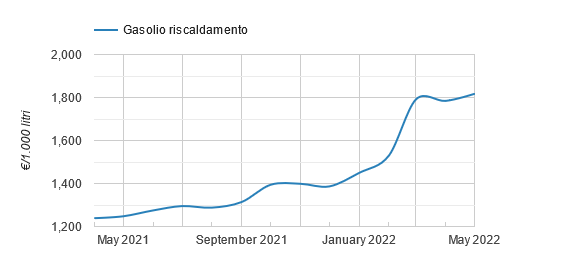
by Marco Biondi
The energy price shocks and the ongoing war in Ukraine caused by the Russian invasion added some good reasons to reconsider our energy mix and become less reliant on fossil fuel imports for our energy needs. This is a key issue to ensure that the just transition towards a climate neutral economy will be really accomplished as established by the European Green Deal.
On 8 March 2022, the European Commission stated that EU States can consider “temporary tax measures on windfall profits and exceptionally decide to capture a part of these returns for redistribution to consumers”. However, there has not yet been a common proposal on how to face dependency from Russian fossil fuels. Italian Prime Minister Mario Draghi suggested common gas acquisitions and stockages across Europe, and many States launched the idea to decouple soaring gas prices to reduce its impact on electricity bills. According to Politico, however, Germany and Netherlands showed skepticism towards this kind of measures, playing the “role of the evil liberals, reminding their fellow leaders that if the EU decides to pay less for gas, suppliers may well decide to sell elsewhere.” So, what’s left to do?
According to Alfonso Scarano, an independent financial analyst interviewed by Andrea Turco for Valigia Blu, price increase on the Italian financial market led to an “induction” of price increases in consumption even months before the onset of the war in Ukraine. “The physical price broke away from the speculative one”, he explained, and this speculative shock allowed the main Italian gas companies like ENI, Snam and Edison to profit. Scarano also stated that more taxes on excess profits are not enough, and that an “independent investigation is needed to understand and clarify if certain subjects have established cartels and under-the-table agreements”. However, there must be the political will to “oblige companies such as ENI to return what they have earned to those who have lost a lot or all.”
Heating oil price in Italy, by Ministry of Ecological Transition
Gas prices in Italy increased by 800% between December 2020 and December 2021. The Italian energy company ENI registered a 4.7 billion euros profit only in the last quarter, the highest result from 2012, as stated in their latest press release.
As stated by the European Commission in December 2019, “the European Green Deal (…) is a new growth strategy that aims to transform the EU into a fair and prosperous society, with a modern, resource-efficient and competitive economy where there are no net emissions of greenhouse gases in 2050 and where economic growth is decoupled from resource use. It also aims to protect, conserve and enhance the EU’s natural capital, and protect the health and well-being of citizens from environment-related risks and impacts. At the same time, this transition must be just and inclusive. It must put people first, and pay attention to the regions, industries and workers who will face the greatest challenges.” In light of these objectives, we should ask European governments why the transition from Russian fuels is not as green as it could be. Why are we just relying on fossil fuels from other states instead of designing long-term solutions? 2050 is nearer than we imagine, and scientists do not guarantee that we have so much time. In fact, the latest IPCC report published stated that “without immediate and deep emissions reductions across all sectors, limiting global warming to 1.5°C is beyond reach.” Moreover, according to World Inequality Lab’s author Lucas Chancel, “climate policies have been disproportionately borne by low-income consumers over the past decades, in particular via carbon and energy taxes. More emphasis should be placed on wealthy polluters. This can be done via policy instruments targeting investments in polluting and fossil activities. Progressive wealth taxes on the ownership of polluting activities could accelerate divestments, reduce pollution levels of the wealthiest and generate much-need resources to scale-up investments in low-carbon infrastructures. Ultimately, the ownership and sale of assets associated to new fossil projects should be prohibited.”
There cannot be a just transition on a dead planet. Applying fair taxes on all energy companies’ profits would be a first step to achieve concrete social justice and reduce inequalities across the European population. EU governments should take advantage from this crisis to accelerate the green transition process. Trying to diversify our gas sources and buying more LNG from USA is an acceptable geopolitical short-term solution, but it’s not the answer if we really want to make our system sustainable from all the points of view. We often hear theories that explain that economic costs of fighting climate change are too high, but they will be higher if we do nothing at all. A new study shows that expenses will be 15 times higher if we do not act: “The economic benefits of policies to curb climate change usually will outweigh the associated costs, especially if persistent climate damages slow economic growth. But the non-economic benefits stemming from avoided deaths and the improved well being of future generations make the climate policy cost-benefit analysis more compelling yet.”
In “Don’t Look Up”, the latest Adam McKay’s movie starring Leonardo Di Caprio and Meryl Streep, people were told by the American government not to look up to avoid seeing the meteor that was about to strike planet Earth. Real governments all over the world are ignoring the climate emergency in the same way, but the only way to pretend not to see it is not looking anywhere.

